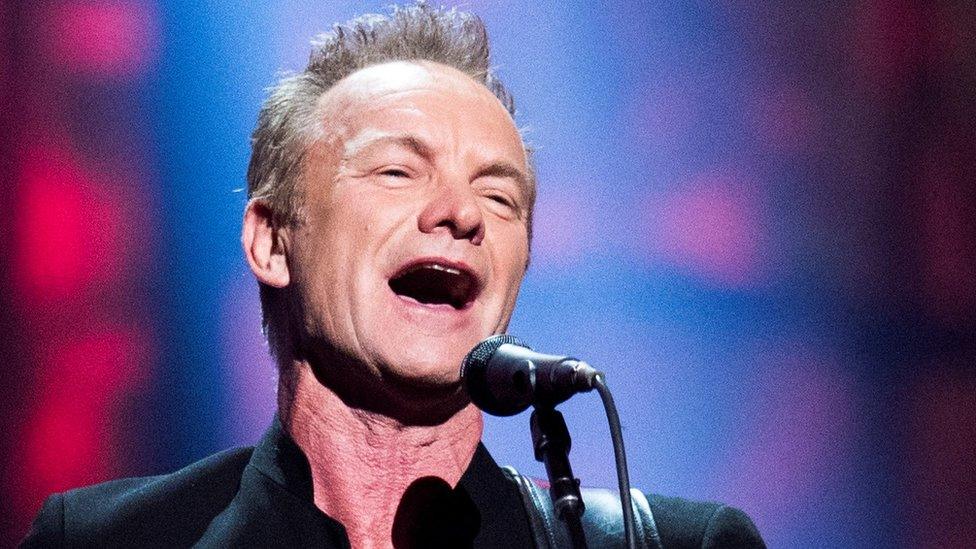Master of None: Music supervisor Zach Cowie shares his soundtrack secrets
- Published
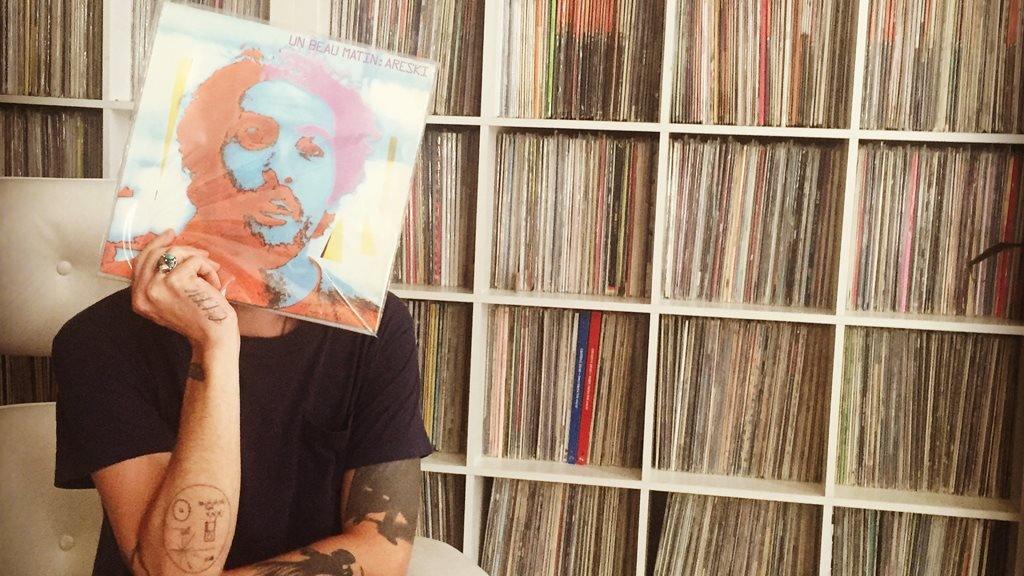
Zach has a collection of more than 10,000 vinyl albums in his LA apartment
How does a hit song end up in a TV show? It's not as simple as it seems.
Every musical moment has to be tested, approved and licensed before it appears on a soundtrack; and that process can take months upon months upon months.
It's all the responsibility of a music supervisor, who plays a critical role in establishing the atmosphere and tone of a series, hand-picking tracks to accompany the action, and getting them cleared for broadcast.
The job has been around for a long time, but there wasn't a "famous" music supervisor until Alexandra Patsavas, external started working on teen drama The OC.
She gave acts like The Killers, Death Cab For Cutie and Imogen Heap a big break by including their music on the show; and went on to work on Grey's Anatomy, Mad Men and the Twilight series.
Now, shows like Stranger Things, Skins, Girls and The Handmaid's Tale use hit songs as a matter of course. The Emmys recently created a new category for music supervisors, reflecting their increasing importance in the industry.
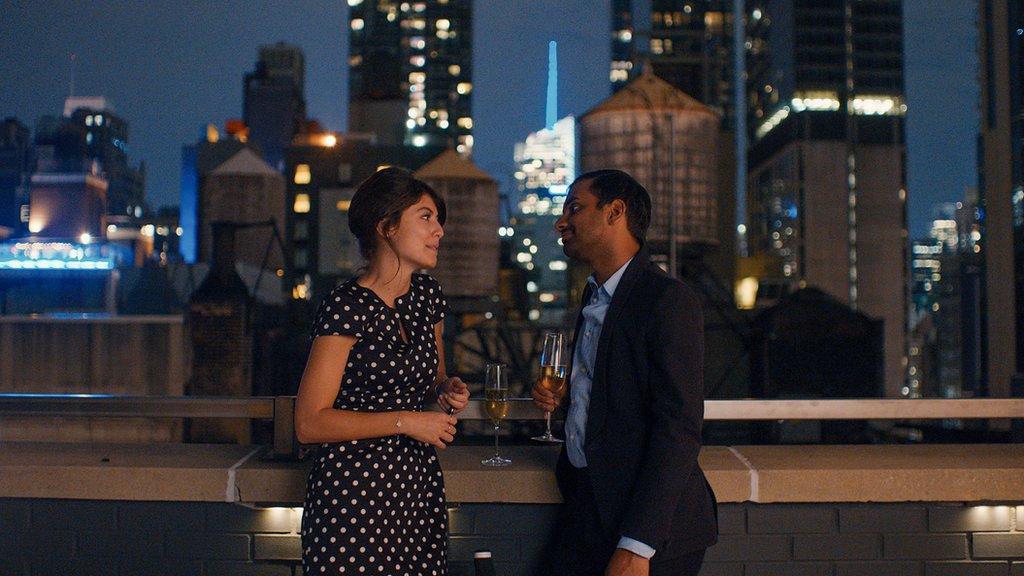
Master Of None debuted on Netflix last year, and its soundtrack quickly garnered attention
One of the main contenders for the inaugural award is Zach Cowie, who works on the award-winning Netflix show Master Of None.
Together with creators Alan Yang and Aziz Ansari (who also stars), he has stitched music into the fabric of the show - a visually sumptuous, pin-sharp comedy about... well, everything: Love, life, work, food, family, sexism, racism, dating, pets and pasta.
A key scene in the recently-released second series is "Dev's Sad Cab Ride", a continuous, three-minute shot of Ansari's character, Dev, travelling home from a disastrous date. As the camera lingers unflinchingly on his face, Soft Cell's Say Hello, Wave Goodbye tells you everything that's running through his mind.
Speaking to the BBC from Los Angeles, Cowie discussed that sequence, and other highlights from working on the show.

How did you end up working on Master of None?
I DJ a lot around Los Angeles and I met Alan and Aziz just from spinning records at parties. And then they saw a movie I worked on, called Celeste and Jesse Forever, external, That kind of put me on their radar as, maybe, more than just "the DJ guy".
And when they sold the show to Netflix, Alan just texted me and said, "would you consider working on it?" So it really just fell into my lap.
It sounds like a fairy tale!
It was a real dream come true for me. As soon as I realised music supervision was a job, I was like, "I would love to do that!" but I had no idea on how to start, because it's such a new position that there isn't really a guide book on how to crack into it.
I just tried to do as much as I could to put music into this world. That's how I got this job [and] that's how I got Celeste and Jesse, being a guy who wouldn't shut up about records every time I opened my mouth!
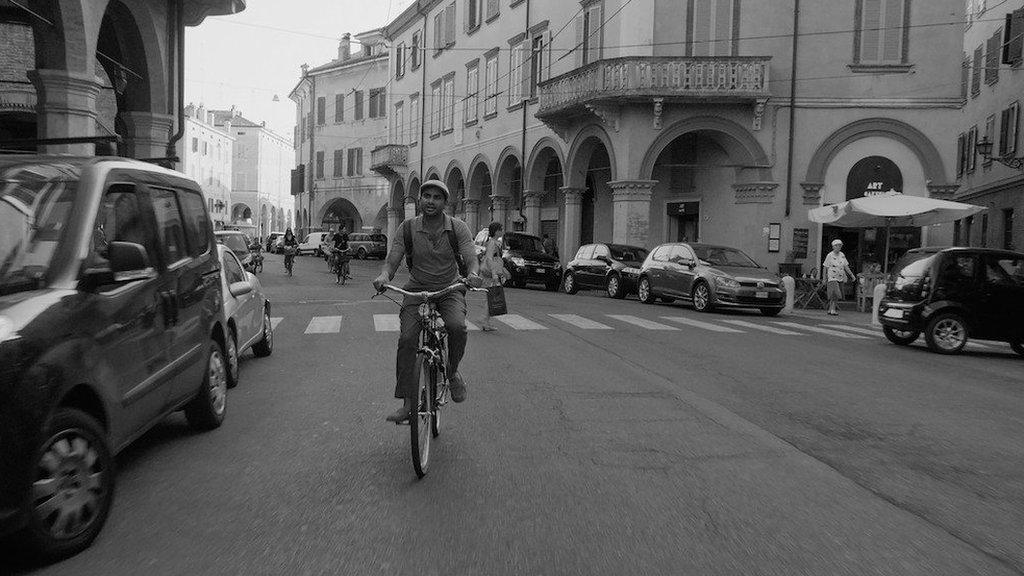
Master of None's Italian episodes, filmed in Modena, feature a mix of classic film scores and 1970s Italo-disco
With Master of None, at what stage do you get involved in the show? Is it right at the beginning?
Well, for season one, I sort of showed up when the scripts came together. For season two, since we'd established how much of a role music plays in the storytelling, they brought me in before the scripts were even written.
We'd have conversations about the themes they explore, and we share ideas between the three of us in a playlist.
They're listening as they write and a lot of times when the scripts show up, they have ideas from our playlist baked into them. But there's still tons of stuff that I can't even touch until I see the footage.
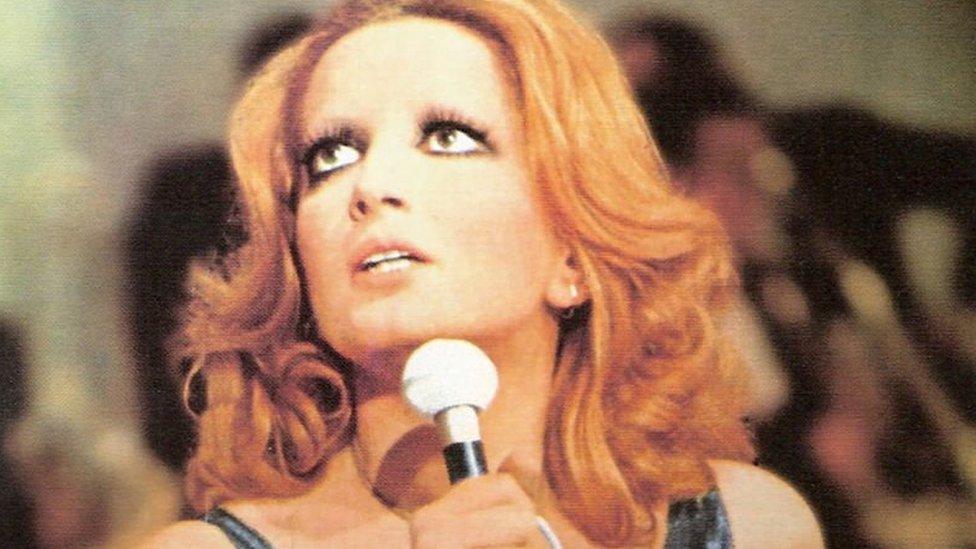
The distinctive vocals of Italian pop star Mina - who has scored more than 70 hit albums in her home country - features heavily on the soundtrack
The first few episodes of season two are set in in Italy. Did you know much about Italian music before you started?
It's all stuff I had in my collection, except for the singer Mina - who was one Aziz's discoveries, when he was living there researching the season. He was there for months, learning how to make pasta, and learning how to speak Italian.
The rest of the Italian music in the first episode is all re-purposed 1960s film score, which is stuff that I love, so I had a lot of that.
Overall, then, what's the ratio of songs you know versus ones you've had to track down?
That's where I've got really lucky, because I'm a very obsessive researcher. If there's something I'm interested in I will, like, get to the end of the internet by tomorrow!
And I've got about 20 years of that stored up.
In fact, if there's something I feel less confident about - for instance, classical music was the last one for me to get my head around - I make it my job to learn it.
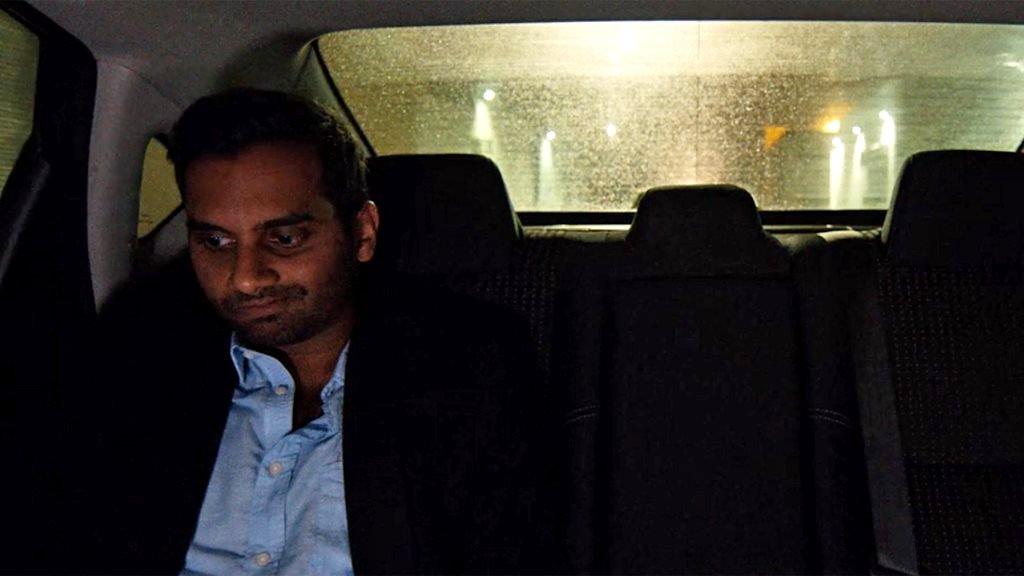
Try watching "sad cab ride" with the sound down, and its impact is completely diminished, illustrating the importance of music to the show
How did the "sad cab ride" scene evolve?
It was Aziz's idea! They thought to do that long shot at the last minute and when the dailies [raw footage] came through, as we were looking at them, he thought of that song.
The second we synced it up, I was like, "This is so perfect".
So your job was done for you!
TV is such a new world for me but I've found, even in my limited experience, there's a lot of people who seem to think they need to change something in order to show that they're doing their job.
But I was so happy in the moment, that my job just became saying, "This is perfect, let's do it." I didn't even throw any pitches in there. I was so transported by that moment, and I knew I'd never be able to top it.
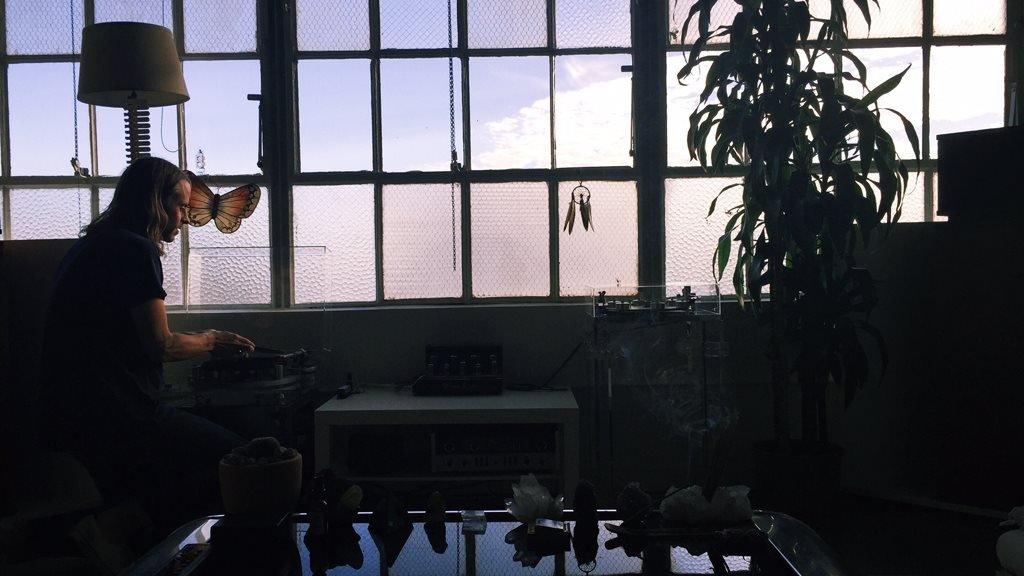
Zach Cowie worked at influential indie label Sub Pop before moving into music supervision
Were the any songs you tried out that didn't work?
In the ninth episode there's a sequence in an outdoor sculpture gallery. We had an idea [for the music] in the script - but the second Aziz went to the set and sent me some pictures, we were like, "Oh crap, we need a new idea!"
What did you do?
Truth be told, I'm not much of a TV person. I don't even have one. But I watch a lot of films and a lot of my inspiration comes from those.
And the way I cracked that montage was by thinking about the film Paris, Texas. It's scored by Ry Cooder just playing solo guitar - all these sweeping wide shots with just this little guitar under them. And that's what led me to trying a John Fahey track [Sunflower River Blues] in this scene, and it worked so perfectly. I owe that all to Wim Wenders.
What was the track you'd originally planned?
I'm not even going to say it, because it's so dumb!
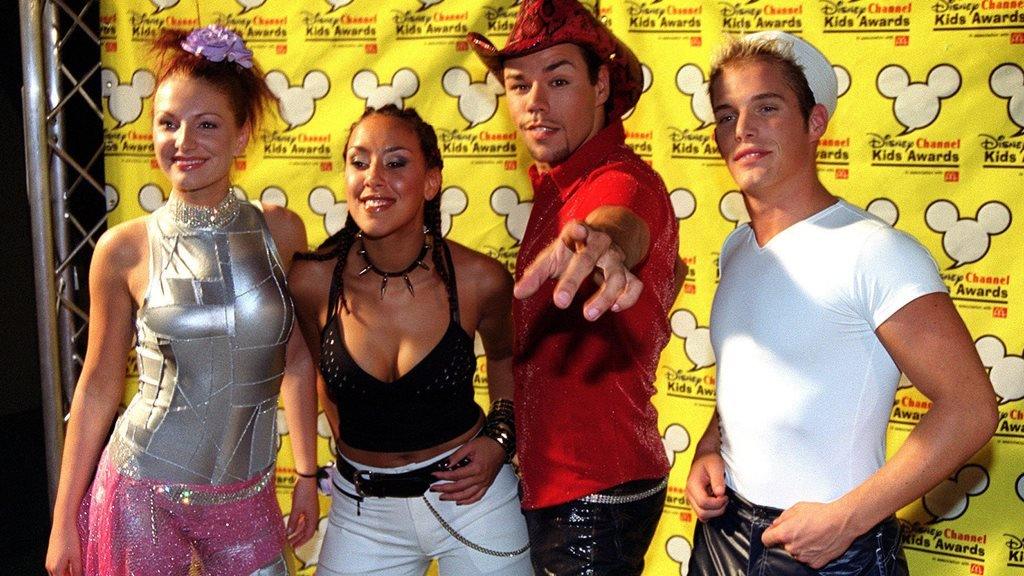
The Vengaboys get a brief return to the spotlight when Master Of None plays We Like To Party (The Vengabus)
At the other end of the scale, the soundtrack also features the Vengaboys and Scatman John. How much work goes into finding the perfect variety of cheese?
That's another instance where I'm happy to give credit to Alan and Azari. I those the comedy cues and when it comes to the laughs, I leave it to the comedians!
Was there a song you wanted to use but you couldn't get the rights to?
We got so lucky with being able to clear the stuff that we wanted and a lot of that credit goes to my co-supervisor on the show, who's called Kerri Drooton, and she is a relentless detective - because the sad side to music supervision is that half of it is paperwork and negotiation.
The one we almost couldn't get, which would have been heartbreaking, was the Amarsi Un Po song, which is the namesake of the ninth episode.
The guy who sings that song, Lucio Battisti, is one of the most well-known pop singers in Italy of the 60s, 70s and 80s, but he denied all licensing requests for his entire career. And really, through Carrie's persistence, we were granted permission to use his song by his estate. In fact, we're the first people ever to license his music outside of Italy.
It would have crushed us not to get it, because that song became such a touchstone for the whole season.
Master of None is available to stream now on Netflix, external. The soundtrack is available on Spotify, external; and will be released on vinyl, external later this month. You can also follow Zach's upcoming project, as well as the soundtracks for other major TV shows on Tunefind, external.

Follow us on Facebook, external, on Twitter @BBCNewsEnts, external, or on Instagram at bbcnewsents, external. If you have a story suggestion email entertainment.news@bbc.co.uk, external.

- Published19 September 2016
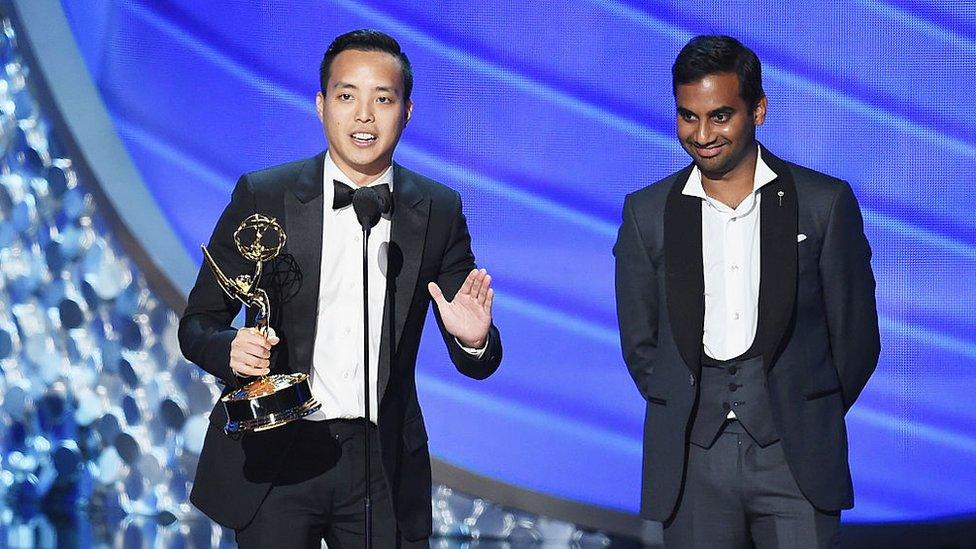
- Published4 January 2017
